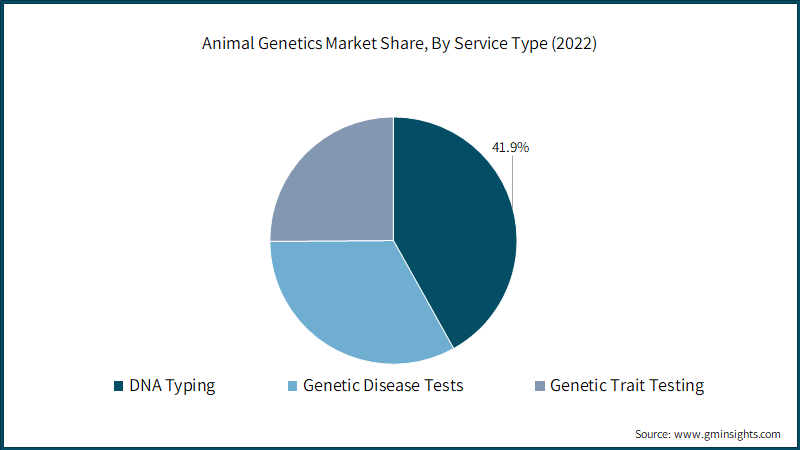Home > Animal Health & Nutrition > Veterinary Medical Devices > Animal Genetics Market
Animal Genetics Market Analysis
- Report ID: GMI4953
- Published Date: Aug 2023
- Report Format: PDF
Animal Genetics Market Analysis
Based on animal type, the animal genetics market is segmented into canine, porcine, poultry, bovine, and other animals. The poultry segment accounted for the largest share of 35.4% of the market in 2022. There is a substantial rise in the demand for superior quality foods such as eggs, meat and milk compared with food of plant origin. The change in consumption pattern coupled with increasing population and urbanization have led to increase in the demand for poultry farming industry. Since, poultry animal products are in high demand and will constantly grow, it will also propel the overall market trends.
Also, advancements in genetic research have enabled the development of breeds with enhanced traits, including better disease resistance, feed efficiency, and meat quality. The push for sustainable and efficient agriculture is pushing farmers to invest in genetically superior poultry stock. These combined forces are fuelling the growth of the poultry segment in the market.

Based on service type, the animal genetics market has been classified into DNA typing, genetic trait testing, and genetic disease tests. The DNA typing segment accounted for a business share of 42.4% in 2022 and is expected to grow at a considerable rate of 5.3% over the forecast timeframe. The rising need for accurate pedigree verification and traceability is pushing for advanced genetic identification methods. The application of DNA typing in breeding programs for disease resistance, productivity, and desirable traits is propelling its adoption. Additionally, the decreasing costs of DNA sequencing and increasing awareness among breeders about its benefits are driving growth. Moreover, regulatory requirements for livestock and animal product traceability are further boosting the demand for DNA typing technologies.

North America animal genetics market is anticipated to reach USD 3,220.3 million by 2032. The region's robust and well-developed livestock industry, including dairy and beef production, is fuelling the demand for advanced genetics to enhance traits like yield and disease resistance. Technological advancements and research investments in genetic improvement are propelling the adoption of cutting-edge breeding techniques. Also, a growing consumer focus on high-quality animal products and ethical considerations is pushing for genetic enhancements. Additionally, supportive regulatory frameworks and strong market players are contributing to the growth of the market in North America.

